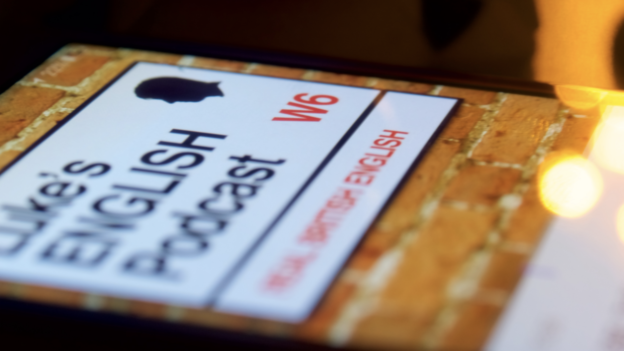A conversation with Andy Johnson including loads of idiomatic expressions and their explanations. First you can listen to a rambling chat with Andy and then I’ll explain 25 idioms that came up during the conversation. Part 2 coming soon… Transcriptions, Vocabulary list & Definitions available.
![]() [DOWNLOAD]
[DOWNLOAD]
Introduction Transcript
Hello folks – in this episode I’m talking again to Andy Johnson from The London School of English, and while we’re talking we’re going to play an idioms game, so you can practise your listening with this conversation and also learn some natural English expressions in the process.
Alright Andy? I’m going to do the introduction to this episode, with you here. Sometimes I’ll check in on you, just to see if you’re still there and to see if you’re ok with what I’ve said. OK?
Andy’s been on the podcast a couple of times before but if you haven’t heard those episodes here’s some intel on Andy J, to bring you up to speed. This is the Andy Johnson Fact File.
Andy Johnson started out working in marketing before becoming an English teacher. He’s been teaching English for … a number of years (I think it’s about 15 years now). He did the DELTA qualification at the same college as me (name of that college? That’s UCL in London) and has worked for The London School of English for over 10 years, first as a teacher and now as the Director of London School Online – that’s the London School’s online operation, and yes – I’m calling it an operation, which makes it sound either like they’re surgeons, or special agents and perhaps they are somehow a combination of both of those things – but for online English courses. London School Online offer various online courses for learners of English and other things of that nature. Get more details at http://www.londonschoolonline.com
Actually the correct link is www.londonschool.com/lso
Andy is a runner. He runs marathons, which is great considering he nearly lost a leg when he was younger, and when I say “lost” a leg I don’t mean that he just couldn’t find it for a while, like “oh where’s my leg? I put it down a earlier and I can’t find it… Ah, there it is! Oh, I nearly lost a leg there!” no, I mean he nearly had to have it removed permanently, which sounds like it was a very frightening and horrible experience. There’s an emotional and inspirational story that explains what happened, which you can hear if you listen to episode 472 when Andy talked about it.
472. Andy Johnson at The London School (Part 2) Why Andy runs marathons
So, despite an early issue with his leg, Andy is a runner and in fact at the moment he is training for the London Marathon which happens next month.
Andy is married and has two children who are boys. He sometimes steps on pieces of their lego, which I understand is incredibly painful. Lego comes from Denmark but Andy Johnson is half Swedish.
But Sweden and Denmark are both scandinavian countries, so the link still works somehow.
However, this does not lessen the pain he experiences when he steps on Lego.
Andy has a good joke about Swedish military ships having barcodes so that when they come into port they can “scan the navy in”, which sounds like “scandinavian”. It’s a good joke, despite the way I just told it just then.
As an English teacher Andy often attends teaching conferences where he presents talks to other English teaching professionals. Previously we talked about his talk on millennials in the English language classroom which he has done at various conferences including the IATEFL conference, which is like the Glastonbury Festival but for English teaching.
Andy also looks a bit like Moby (the American musician, DJ, record producer, singer, songwriter, photographer and animal rights activist) but a better-dressed version. Sometimes people mistake him for Moby, with hilarious results, as we have heard on the podcast before.
So, Andy is like a better-dressed, half-Swedish half-English English teaching Moby look-a-like who runs marathons, steps on his kids’ lego and talks about teaching English to millennials at conferences. But he’s so much more than that.
Andy Johnson everybody…
Spot the Idioms
As well as having a conversation, in this episode we’ve also decided to play a game as a way of including a language-focus – in this case idioms. You have to spot at least 6 idiomatic phrases in this conversation, although there will definitely be more than 6.
Andy and I have both chosen 3 idioms to include in our conversation.
What are idioms?
Remember – idioms are fixed expressions with a particular meaning – a meaning that might not be obvious when you take them on face value. The meaning of the phrase is different from the words used in the expression. They don’t have a literal meaning.
Really common idioms (which you probably already know) are things like “That was a piece of cake”, meaning “That was easy” or “It’s just not my cup of tea”, meaning “I don’t really like it”. Those two are really common and well-known ones that just happen to involve food. A third example might be “Well, you’ve really hit the nail on the head there” – to hit the nail on the head, which we use when someone has made exactly the right comment – the sort of comment which perfectly explains or sums up the situation. “Well, you’ve really hit the nail on the head there”.
Andy and I have both chosen 3 idioms – but we haven’t told each other what they are yet. We’re going to play a little game while taking part in our conversation.
Idioms Game
The rules of the game are this:
- We have to seamlessly include the idioms into the conversation. We should find a way to include the idioms in a natural way – so they are used correctly for the context of the conversation, and not too obviously. They shouldn’t stick out like a sore thumb, for example.
- Both of us have to try and identify which idioms we chose, and when we hear them – write them down.
- At the end of the conversation we will state which idioms we thought were the the pre-prepared ones. For each correctly identified pre-prepared idiom, we get a point.
It is possible and indeed encouraged to slip in some other idioms as distractions, but these must not be pre-prepared. They can only be expressions that could naturally have come up in moments during the conversation.
So basically – I have to spot Andy’s 3 pre-prepared idioms, and he has to spot my 3 pre-prepared idioms.
A strategy could be – to insert your pre-prepared idioms into the conversation without them being too obvious, while perhaps attempting to distract each other or tempt each other with other idioms that we just include on the spur of the moment.
You can play too, ladies and gentlemen. Try to spot the 6 idioms we have pre-prepared. Also watch out for any other expressions that might not be on our lists, but which are worth learning too, like for example “to stick out like a sore thumb” or “on the spur of the moment”.
At the end I’ll go through all of the idioms and clarify them.
Conversation begins – and then pauses before Andy tells us about being abused on Twitter.
More Transcript…
Hi everyone,
I’m pausing the conversation right there. Andy is about to tell us about he got abused on Twitter, but you’ll have to wait until part 2 to hear that story and the rest of the conversation and the results of our idioms game.
But Luke, why are you pausing here?
The whole conversation went on for about 90 minutes and this time I thought I’d split it into two episodes – mainly because I want to take a bit of time to highlight certain features of language that you have heard already in the conversation, namely – all the idioms that have come up so far. We’re focusing on idioms in this one.
You know that we’re playing an idioms game in this episode and I wonder if you’ve been paying attention, trying to spot the idiomatic phrases that we prepared in advance.
But as well as the pre-prepared expressions, there are loads of other ones that are just coming up naturally.
So I’d like to highlight all the idioms which have come up so far. I’ve listened back to the conversation and made a list of all the idioms I could hear.
Let me now go through them. I’m not going to tell you which ones are the pre-prepared ones, except to say that only one pre-prepared idiom has been used in the conversation so far. That’s one out of the 6 pre-prepared ones. Only one has been used so far. The other 5 will come up in the next conversation.
So, I’m not telling you which one that is. What I am going to do though, is explain every idiom that has come up in part 1.
Here we go.
Vocabulary List + Definitions
Idioms and Expressions that you can hear in this episode (Part 1)
- Here is some intel on Andy J to bring you up to speed.
Intel = intelligence. This is just information but it’s a word used by the secret service. “Our agents have collected some valuable bits of intelligence.” “What’s the intel on the British Prime Minister’s security guards?” - To bring someone up to speed = to give someone the latest information so they are as informed as everyone else. “Hi, welcome back. Let me bring you up to speed on where we are with the negotiations.”
- If Swedes have beef with anybody it’s with the Norwegians
To have beef with someone = to have a complaint to make about someone/something, or to have a long running resentment or grudge against someone/something. E.g. you hear this a lot in rap music. Let’s say Notorious BIG insulted Tupac (maybe he said something about his mum) and then Tupac had a beef with him. (he also held a grudge against him and had a score to settle with him) - You’re holding a grudge against someone = you have an long running bad feeling against probably because of something bad that happened in the past. E.g. Mike stole Dave’s girlfriend, and so Dave’s had a grudge against him ever since. Murray has had a grudge against Nadal ever since he humiliated him in front of the crowds of spectators at Wimbledon a few years ago. Obama made a joke about Trump and so Trump had a grudge against him. He had beef with Obama.
- You’ve got a score to settle with someone = you need/want to take revenge on someone
Have you got your idioms Andy? I’ve already used one. I think I might have jumped the gun a bit there. - To jump the gun = to do something too quickly. Like runners who start the race before the gun.
- Swedes use Norwegians as the butt of a joke
The butt of the joke = the object of the joke. E.g. Years the Irish were the butt of a lot of jokes in England. - There’s some bad blood between the two of them.
Bad blood = a bad feeling between two people because of something that happened in the past - A meaning that might not be obvious if you take them on face value.
Take something on/at face value = you just accept something as the way it is, without realising there is a deeper meaning, or another aspect to it. E.g. if you take an idiom on face value, you might take it literally without realising it has another meaning. Or you might take a joke on face value, and not realise it’s a joke – take it literally. - That was a piece of cake = easy
- It’s just not my cup of tea = I don’t really like it
- You’ve really hit the nail on the head there = you said exactly the right thing at exactly the right moment
- The idioms shouldn’t stick out like a sore thumb = to be very obvious or different from the surroundings or other things
- You shouldn’t shoehorn them in = force them in unnaturally
- To include some unprepared idioms on the spur of the moment = on impulse, without planning in advance
- The Notting Hill Carnival goes on just on the doorstep of the London School = very close to a building
- The guy was clearly half-cut = drunk
- He was sitting on the barrel, two sheets to the wind = drunk (also – 3 sheets to the wind)
https://www.phrases.org.uk/meanings/three-sheets-to-the-wind.html - Did you ever have those socks with the days of the week on? Oh man, that was a minefield.
A minefield = a very difficult situation in which failure or problems are very likely to happen so you need to take great care. - Wait, what’s a street walker? You’re going to have to spell it out.
A street walker / A lady of the night = a prostitute
To spell it out = to make it absolutely clear
It made her look like a lady of the night. - What’s amazing is how many trolls creep out of the woodwork on international women’s day.
to creep out of the woodwork = (a negative expression) when people who are previously hidden or silent, reveal themselves or their opinions. - If you’re feeling a bit peckish and you eat your thumb, the thumb will grow back.
Peckish = a bit hungry - It’s jaw-dropping the amount of misogyny that comes out on days like this
- It’s really eye-opening.
Jaw-dropping = surprising and amazing. It makes your jaw drop open. Wow!
Eye-opening = surprising and you learn something new from it - For him to shine a spotlight on these people and to call them out for their ignorance and their general dickish behaviour, while still raising money and raising awareness for the cause, I just thought it was really really good.
to shine a spotlight on someone = bring attention to someone. Like pointing a theatre spotlight on someone on stage.
To call someone out for something = to publicly bring attention to someone’s bad actions (Hey everybody – this guy criticised millennials!!) - Who is this guy to slag off a whole generation?
To slag someone off = to criticise someone in a really unpleasant way. (a slightly rude expression)
Now that’s the end of the idioms in this episode.
There are more in part 2 and there should also be a bit at the end where I explain the vocabulary too.
I think this is really useful when I do this. What would really help you now is if you listened to the conversation again. Now that I’ve highlighted the idioms, listen to the conversation again and I 100% promise you that you will notice them more easily and you are also far more likely to remember them and be able to notice them again.
Listening to conversations I have on my podcast with my guests is definitely important, but I think that just highlighting some of the language you’ve heard by picking out certain phrases, repeating and explaining them – this can make a crucial difference in your ability to really learn English from my episodes.
It’s something I think is valuable and I’m looking at ways of introducing this sort of thing more permanently.
For example – an idea I’m thinking of and I’m nearly ready to do it – would be to introduce a paid premium service for just a few Euros a month, where you’d get regular language review episodes where I go through language you’ve heard in episodes. The episodes would be available to premium subscribers in the app and online via a computer.
Preparing language reviews is time consuming for me and adds a lot more work than just preparing a conversation, recording it, editing it and publishing it as a free podcast. I have to listen again carefully, note certain language features and then spend time clarifying them on the podcast.
A paid premium subscription option would allow me to do it more properly and regularly and would mean my time and work is being rewarded, and you’d get really valuable episodes in which I explain the language you’ve heard but might have missed in episodes.
Let me know what you think. From your end, it would be like this. You could sign up for LEP premium online via my host Libsyn. You’d need to pay a little bit of money per month, not that much – probably just the price of a pint of beer per month for me. Then you’d be able to sign into my app and get access to a certain number of premium episodes. Those episodes would be primarily about language. I do various types of episode on LEP – some of them don’t involve language teaching or a language focus although of course it’s all good for your English because you’re getting valuable exposure to the language and I’m here to help. BUt the premium episodes would all be about language and mostly they’d involve me explaining, clarifying and demonstrating English that you’d heard occuring naturally in normal episodes of LEP. So they’d be like Language Review episodes. You’d be able to listen to normal episodes of LEP and then several Premium episodes too which would explain, clarify and expand on the vocab, grammar or pronunciation you’d heard in the normal episodes.
I’m also planning to include other things for the premium package – including finishing off APVAD. I think the only way I can continue the phrasal verb episodes is if they’re part of a premium package.
And don’t worry – if you can’t get the LEP app, you’d still be able to access premium content from a computer on the premium page.
Anyway, this is in the pipeline. Things move a bit slowly here at LEPHQ but I’m getting there.
In the meantime, get the LEP app. More free extra stuff keeps popping up there. I recently uploaded Episode 518b which is part 2 of the grammar questions episode. Check it out.
Also, sign up to the mailing list on the website if you haven’t already done that.
Time to go now!
Speak to you again with Andy in part 2 of this episode where you’ll learn some more idioms and also find out what happens in our idioms game.
Cheers!
Bye.
Luke










